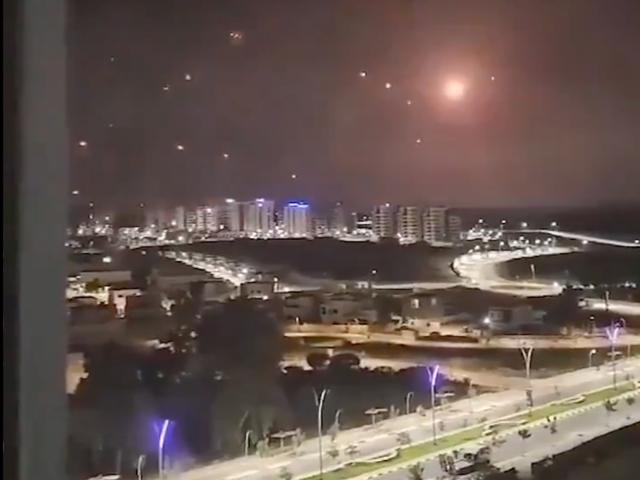In the latest dramatic escalation between Israel and Iran, Israel’s Security Cabinet is set to convene for a high-stakes vote regarding the nation’s military response to an unprecedented missile attack launched by Iran. The attack, which occurred on October 1, involved ballistic missiles fired directly at Israeli targets—a brazen act of aggression Tehran claims is in retaliation for the death of Hezbollah leader Hassan Nasrallah.
Iran’s bold strike has not only challenged Israel’s national security but has also set the stage for a potential regional conflagration. Israel’s Defense Minister, Yoav Gallant, has vowed a swift and devastating response, stating that Israel’s counterattack “will not just surprise, but stun Iran as well as the world, which is closely watching.” Gallant’s message is clear: Israel will not tolerate threats to its sovereignty or the safety of its citizens, and the coming retaliation will reverberate far beyond Tehran.
Israel DM Gallant: “The strike on Iran will be precise and unexpected; they won’t know what hit them.” pic.twitter.com/SqKcbpUWoK
— Open Source Intel (@Osint613) October 9, 2024
Tehran’s Streets Reflect a Defiant Regime
On the streets of Tehran, loyalists of the Islamist regime have put on a façade of calm, with many expressing an air of defiance as the country braces for Israel’s impending strike. In the bustling Tajreesh market, located near the Imamzadeh Saleh mosque and shrine—one of northern Tehran’s most important pilgrimage sites—residents downplayed the threat posed by Israel, dismissing it as insignificant.
“Israel is nothing,” proclaimed Ali Mousavi, a market vendor, to a CNN reporter. His voice echoed with a mix of arrogance and propaganda. “50,000 innocent people have been killed by Israel. Why? What does the U.S. want in our region?” Despite the absurdly exaggerated figure of 50,000—a claim left unchallenged by CNN—the narrative reflects a familiar rhetoric. Even Hamas, notorious for inflating casualty figures, has never claimed numbers this high. Independent analysts estimate that around 18,000 to 20,000 of the casualties include militants, a fact deliberately omitted by Iran’s supporters.
"@CNN's inaccurate translation substituted Iran’s openly genocidal rhetoric – calling for Israel’s destruction – with language that worked to depict Iran as the victim of Israeli bellicosity."
— David Litman (@dmlitman) October 10, 2024
My latest at @CAMERAorg: https://t.co/E3CEaELxeX https://t.co/IbJW13QsMc
Another Tehran resident, Hamid Ashuri, further amplified anti-Western sentiments, arguing that U.S. support for Israel is the root cause of the conflict. “This is not just a fight against Israel, but against the West,” Ashuri declared. “If the U.S. didn’t support Israel, they wouldn’t dare to do anything.”
Yet, while some voices in Tehran express steadfast loyalty to the regime, many see through the hollow bravado. Much of this rhetoric seems carefully orchestrated for the cameras, lacking the authenticity of genuine grassroots sentiment.
As Iran and its terrorist proxies wage war against the Jewish state, CNN owes its audience the truth about Iran’s goal: the destruction of the Jewish state. This is especially so when Iran itself states it publicly.https://t.co/8eJan2wJbW
— CAMERAorg (@CAMERAorg) October 10, 2024
Dissent Beneath the Surface: Iranians Speak Out
Behind the facade of regime-backed loyalty lies a much deeper undercurrent of dissatisfaction within Iran itself. In anonymous Twitter Spaces and underground discussions, Iranian dissidents continue to speak out against the regime’s reckless behavior and aggression. Many of these voices stress that the Islamic Republic’s foreign policy does not reflect the will of the Iranian people.
One dissident, who remains unnamed for safety reasons, expressed frustration: “Don’t confuse Iranians with the mullahs and their supporters. We are the Persians. Our Shah was sent into exile by these vile creatures who torture anyone who does not follow their medieval values. Many of us are not even Islamic, yet we have to pretend otherwise, dress a certain way, and attend state-mandated events out of fear for our lives.”
#IRAN
— 🇰🇼🗡 السيف 🗡🇰🇼 (@alsaif_ku) October 10, 2024
In a few days, the Iranian Republic will fall, the Shah's era will return, the Iranian people will live life, every expatriate will return from his country, and they will enjoy a democratic and free state. Congratulations on the monarchy pic.twitter.com/dpr954zBr2
This growing divide between the Iranian people and their oppressive government underscores the internal crisis Tehran faces as it escalates tensions abroad. Many Iranians, particularly the younger generation, long for a return to their pre-Islamic heritage and resent the regime’s obsessive focus on exporting its revolutionary ideology to neighboring countries, all while neglecting its own citizens.
#Israel's @IDF finds that #Iran's regime provided arms to #Hezbollah which were from the Shah's army before the 1979 Islamic Revolution. https://t.co/PAu6zHjH4u
— Jason Brodsky (@JasonMBrodsky) October 10, 2024
Iran’s Dangerous Gambit: The World Watches
As Israel prepares for its imminent military response, Iran has issued ominous warnings, threatening a powerful retaliation should Israeli forces strike Iranian territory. Iranian officials have also urged the United States to refrain from intervening, claiming that any U.S. involvement would escalate the conflict into a broader war.
But Israel’s message is firm: Tehran has crossed a line, and the consequences will be severe. With the world watching, Israel stands ready to defend its people and its sovereignty. The upcoming decision by Israel’s security cabinet will shape the next phase of this conflict—one that has the potential to reshape the balance of power in the region.
PREDICTION: Israel will strike Iran on Yom Kippur
— Jay Engelmayer (@jengelmayer) October 10, 2024
OPERATION NAME: Atonement
RATIONALE: The country is closed. Roads are closed. Businesses are closed. The citizens are at or near their homes and thus shelters.
A strike on Iran will get an immediate response according to the…
In the coming days, Israel’s retaliation could send shockwaves across the Middle East, stunning not just Iran but any nation that dares to underestimate Israel’s resolve.


